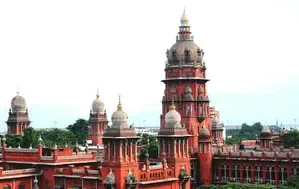Government Approves Appointment of Four Permanent Judges in Madras High Court

Synopsis
Key Takeaways
- Appointment of four permanent judges in Madras High Court.
- Decision made based on Supreme Court Collegium's recommendation.
- Judges appointed include Ramasamy Sakthivel, P. Dhanabal, Chinnasamy Kumarappan, and Kandasamy Rajasekar.
- The President exercises powers under Article 217 of the Constitution.
- Statistics on judges’ performance are required for such appointments.
New Delhi, March 4 (NationPress) In a decisive move following the recommendation from the Supreme Court Collegium, the government on Tuesday approved the appointment of four permanent judges to the Madras High Court.
"Utilizing the powers granted under clause (1) of Article 217 of the Constitution of India, the President has appointed S/Shri Justices (i) Ramasamy Sakthivel, (ii) P. Dhanabal, (iii) Chinnasamy Kumarappan, and (iv) Kandasamy Rajasekar, Additional Judges of the Madras High Court, to be Judges of that High Court effective from the date they take charge of their respective positions,” stated a notification from the Union Ministry of Law and Justice.
On February 21, the Supreme Court Collegium, led by Chief Justice of India (CJI) Sanjiv Khanna, sanctioned the proposal for the appointment of Justices Sakthivel, Dhanabal, Kumarappan, and Rajasekar as permanent Judges in the Madras High Court.
The appointment of the Chief Justice and Judges of the High Courts is conducted by the President in accordance with clause (1) of Article 217 of the Constitution. When recommending an additional Judge for permanent appointment, the Chief Justice must provide, along with the recommendation, statistics on month-wise case disposal and judgments delivered by the concerned judge, as well as the number of cases documented in the Law Journal, properly certified.
Additionally, information must be provided regarding the total working days, the number of days the judge actually attended court, and the days of absence during the period for which disposal statistics are submitted.









